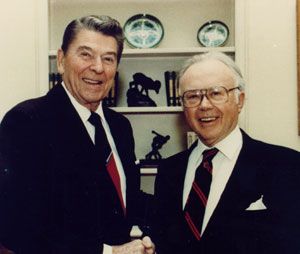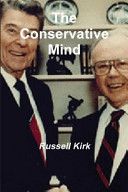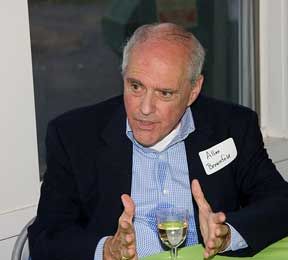
Publisher:
Bonnie King
CONTACT:
Newsroom@Salem-news.com
Advertising:
Adsales@Salem-news.com

~Truth~
~Justice~
~Peace~
TJP
May-07-2014 08:00

 TweetFollow @OregonNews
TweetFollow @OregonNews
Russell Kirk's 'Conservative Mind' at 60
Allan C. Brownfeld Salem-News.comRussell Kirk's notion of conservatism rejects the ideological purity of some present practitioners. It stands for the concept of moral order and confidence expressed in the U.S. Constitution...
 Former President Ronald Reagan and Russel Kirk |
(ALEXANDRIA, VA) - Russell Kirk's landmark book, The Conservative Mind: From Burke To Eliot, was published 60 years ago. TIME magazine devoted its entire book section to The Conservative Mind, which Kirk had originally written in 1952 as his doctoral dissertation at the University of St. Andrew's in Scotland. Gordon Keith Chalmers, president of Kenyon College, reviewed the book in The New York Times and called it ³brilliant, even eloquent.²

Kirk told the world that there was an Anglo-American conservative intellectual tradition that stood apart from its liberal counterpart. For all who knew him, Russell Kirk was a gentleman and scholar. He always sought to understand how men and societies work and interact, and to carefully delineate those things that are permanent and must be preserved from those that are temporal and can and often must -- be altered. For many years, he and this writer were friends.
The Conservative Mind was a bestseller and has never been out of print. Speaking at a testimonial dinner in Kirk¹s honor in Washington, D.C., in 1981, President Ronald Reagan said, ³Dr. Kirk helped renew a generation¹s interest in and knowledge of Œpermanent things,¹ which are the underpinnings and the intellectual infrastructure of the conservative revival of our nation.²
To those who argued that it was primarily liberal ideas that defined the American experience, Kirk, through extensive discussion of Edmund Burke, John Adams, James Fenimore Cooper, Nathaniel Hawthorne, Benjamin Disraeli, Herman Melville, T. S. Eliot, and George Santayana, articulated a different intellectual and moral tradition. It was a tradition with deep roots in the past in the Judeo-Christian value system, the Graeco-Roman intellectual heritage, and the English evolution of democratic self-government that commenced with the Magna Carta.
It was Kirk¹s view that our nation, if it is to remain free, must understand and remember the historical roots from which it emerged. In a forward that he wrote in 1992 for a new edition of The Roots of American Order, he noted, ³Lacking a knowledge of how we arrived where we stand today, lacking the deep love of country which is nurtured by knowledge of the past, lacking the apprehension that we all take part in a great historical continuity -- why, a people so deprived will not dare much, or take long views. With them, creature comforts will be everything; yet, historical consciousness wanting, in the long run they must lose their creature comforts too.²
The roots of the American order, Kirk showed, went back to the ancient world -- to the Jews, with their understanding of a purposeful universe under God¹s dominion; to the Greeks, with their high regard for reason; to the Romans, such as Cicero, with their respect for stern virtues; and to Christianity, with its understanding of the duties and limitations of man and the importance of the transcendent in our lives. The roots of our order, in addition, include the traditions and universities of the medieval world, the Reformation and the responses to it, the development of English common law, the debates of the 18th century, and the values enshrined in the words of the Declaration of Independence and the Constitution.
The beliefs that motivated the Founding Fathers, Kirk pointed out, flowered from these roots: ³From Israel... America inherited an understanding of the sanctity of law. Certain root principles of justice exist, arising from the nature which God has conferred upon man; law is a means for realizing those principles, so far as we can. That assumption was in the minds of the men who wrote the Declaration... and the Constitution.... A conviction of man¹s sinfulness and of the need for laws to restrain every man¹s will and appetites, influenced the legislators of the colonies and of the Republic.... Thomas Jefferson, rationalist though he was, declared that in matters of political power, one must not trust in the alleged goodness of man, but Œbind him down with the chains of the Constitution.¹²
In four major fashions, Kirk points out, the British experience, for more than a dozen generations, has shaped the United States. He notes, ³The first of these... is the English language and the wealth of great literature in that language.... The second... the rule of law, American common law and positive law being derived chiefly from English law. This body of law gives fuller protection to the individual person than does the legal system of any other country. The third of these ways is representative government, patterned after British institutions that began to develop in medieval times, and patterned especially upon Œthe mother of Parliaments¹ at Westminster.... The fourth is a body of mores, or moral habits and beliefs and conventions and customs, joined to certain intellectual disciplines. These compose an ethical heritage....²
The very language of our current discussions about law -- the rights of the accused, the right to privacy, the presumption of innocence, equality under the law -- all are derived specifically from the British experience and can be found in no other legal tradition. In European civil law, Kirk points out, ³the accused person was presumed to be guilty as charged by a prosecutor; the judge determined the issue to be settled in a case of law.... But under the common law of England, the plaintiff and the defendant, or the prosecutor and the defendant, are regarded as adversaries on an equal footing... the judge remains neutral. A defendant in a criminal case is presumed to be innocent, unless the evidence proves him to be guilty beyond a reasonable doubt.²
The rights we take for granted go back to the Magna Carta. In his ³Commentaries on the Laws of England,² an American edition of which was published in 1771-72, William Blackstone found in the Magna Carta the expression of three absolute rights: life, liberty, and property. He traced back to the Great Charter the doctrine of due process of law, and he closely examined the ancient right to trial by a jury of one¹s peers. The American colonists cited Blackstone for authority that no tax might be imposed upon them, constitutionally, without the act and consent of their own legislature.
The fact that the majority of present-day Americans cannot trace their individual ancestry to England bears little relationship to the nature of American culture, Kirk argues: ³Two centuries after the first U.S. census was taken, nearly every race and nationality in the world has contributed to the American population, but the culture of America remains British.... The many millions of newcomers to the U.S. have accepted integration into the British-descended American culture with little protest, and often with great willingness.²
Too often in the modern world, he laments, ³[T]he expectation of change seems greater than the expectation of continuity. Yet, in any order worthy of the name, men and women must be something better than the flies of summer, generation must like with generation.²
Russell Kirk's notion of conservatism rejects the ideological purity of some present practitioners. It stands for the concept of moral order and confidence expressed in the U.S. Constitution -- as well as in the underlying unwritten constitution of custom. Kirk believed in smaller government, but he did not think it would solve all of our real problems. He wanted Americans to search not for a perfect political order but for their spiritual and intellectual roots.
His advice to us is summed up in these words: ³Fulbert of Chartres, in medieval times, declared that we moderns -- that is, the people of his own age -- are dwarfs standing upon the shoulders of giants; we see farther than the giants, but merely because we are mounted on their shoulders. Those giants are the wise men of classical and early Christian epochs. From them Americans have inherited the order of the soul and the order of the commonwealth. If we think to liberate ourselves from the past by leaping off those giants¹ shoulders -- why, we tumble into the ditch of unreason. If we ignore the subtle wisdom of the classical past and the British past, we are left with a thin evanescent culture, a mere film upon the surface of the deep well of the past. Those who refuse to drink of that well may be drowned in it.²
When The Conservative Mind was published, both TIME and Newsweek described Russell Kirk as one of the nation¹s most influential thinkers. He often quoted the 1843 speech of Orestes Brownson at Dartmouth College: ³Ask not what your age wants, but what it needs; not what it will reward, but what, without which, it cannot be saved; and that go and do.²
The Conservative Curmudgeon is copyright (c) 2014 by

Salem-News.com contributor Allan C. Brownfeld received his B.A. degree from the College of William and Mary, his J.D. degree from the Marshall-Wythe School of Law of the College of William and Mary and his M.A. in Government and Politics from the University of Maryland. He has served on the faculties of St. Stephen's Episcopal School, Alexandria, Virginia, and the University College of the University of Maryland.
The recipient of a Wall Street Journal Foundation Award, Mr. Brownfeld has written for such newspapers as THE HOUSTON PRESS, THE RICHMOND TIMES DISPATCH, THE WASHINGTON EVENING STAR and THE CINCINNATI ENQUIRER. For many years he wrote three columns a week for such newspapers as THE PHOENIX GAZETTE, THE MANCHESTER UNION LEADER, and THE ORANGE COUNTY REGISTER. His weekly column appeared for more than a decade in ROLL CALL, the newspaper of Capitol Hill. His articles have appeared in such journals as THE YALE REVIEW, THE TEXAS QUARTERLY, THE NORTH AMERICAN REVIEW, ORBIS and MODERN AGE.
Mr. Brownfeld served as a member of the staff of the U.S. Senate Internal Security Subcommittee and was the author of that committee's 250-page study of the New Left. He has also served as Assistant to the Research Director of the House Republican Conference and as a consultant to such members of Congress as Reps. Phil Crane (R-Il) and Jack Kemp (R-NY) and to the Vice President of the United States.
He is a former editor of THE NEW GUARD and PRIVATE PRACTICE, the journal of the Congress of County Medical Societies and has served as a Contributing Editor AMERICA'S FUTURE and HUMAN EVENTS. He served as Washington correspondent for the London-based publications, JANE'S ISLAMIC AFFAIRS ANALYST and JANE'S TERRORISM REPORT. His articles regularly appear in newspapers and magazines in England, South Africa, Sweden, the Netherlands and other countries. You can write to Allan at abrownfeld@gmail.com
Articles for May 6, 2014 | Articles for May 7, 2014 | Articles for May 8, 2014



Quick Links
DINING
Willamette UniversityGoudy Commons Cafe
Dine on the Queen
Willamette Queen Sternwheeler
MUST SEE SALEM
Oregon Capitol ToursCapitol History Gateway
Willamette River Ride
Willamette Queen Sternwheeler
Historic Home Tours:
Deepwood Museum
The Bush House
Gaiety Hollow Garden
AUCTIONS - APPRAISALS
Auction Masters & AppraisalsCONSTRUCTION SERVICES
Roofing and ContractingSheridan, Ore.
ONLINE SHOPPING
Special Occasion DressesAdvertise with Salem-News
Contact:AdSales@Salem-News.com

Terms of Service | Privacy Policy
All comments and messages are approved by people and self promotional links or unacceptable comments are denied.
[Return to Top]
©2025 Salem-News.com. All opinions expressed in this article are those of the author and do not necessarily reflect those of Salem-News.com.